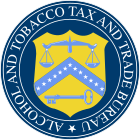Alcohol and Tobacco Tax and Trade Bureau
From Wikipedia, the free encyclopedia
 | |
| Agency overview | |
|---|---|
| Formed | January 24, 2003 |
| Preceding Agency | Bureau of Alcohol, Tobacco, and Firearms |
| Headquarters | Washington, D.C. |
| Employees | 531 (2006) |
| Agency executive | John J. Manfreda, Administrator |
| Parent agency | Department of the Treasury |
| Website | www.ttb.gov |
The Alcohol and Tobacco Tax and Trade Bureau, statutorily named the Tax and Trade Bureau and frequently shortened toTTB, is a bureau of the United States Department of the Treasury.
On January 24, 2003, the Homeland Security Act of 2002 (the Act) split functions of the Bureau of Alcohol, Tobacco and Firearms(ATF), into two new organizations with separate functions. First, the Act established The Alcohol and Tobacco Tax and Trade Bureau (TTB) under the Department of the Treasury. Second, the Act transferred certain law enforcement functions from Treasury to the Department of Justice. The ATF law enforcement functions were transferred to the Justice Department and were renamed theBureau of Alcohol, Tobacco, Firearms and Explosives.
TTB's Field Operations are organized into five divisions:[1]
- National Revenue Center: reconciles returns, reports, and claims; screens applications and promptly issues permits; and provides expert technical assistance for industry, the public and government agencies to ensure fair and proper revenue collection and public safety.[2]
- Risk Management: develops, implements, and maintains monitoring programs for collecting the revenue due the Federal Government and protecting the public, and ensures resources are effectively used.[3]
- Tax Audit: verifies the proper payment of alcohol, tobacco, firearms and ammunition excise taxes and ensures compliance with laws and regulations by taxpayers in a manner that protects the revenue, protects the consumer, and promotes voluntary compliance.[4]
- Trade Investigations: comprises investigators who ensure industry compliance with the laws and regulations administered by the TTB.[5]
- Tobacco Enforcement Division: protects the revenue and promotes voluntary compliance by monitoring the domestic tobacco trade, ensuring only qualified applicants enter the tobacco trade, ensuring compliance with the tax laws relating to tobacco, and facilitating TTB's enforcement functions in cases of non-compliance.[6]
Also, the Advertising, Labeling, and Formulation Division (ALFD) implements and enforces a broad range of statutory and compliance provisions of the Internal Revenue Codeand the Federal Alcohol Administration Act. This act requires importers and bottlers of beverage alcohol to obtain certificates of label approval or certificates of exemption from label approval (COLAs) for most alcohol beverages prior to their introduction into interstate commerce. ALFD acts on these COLAs to ensure that products are labeled in accordance with federal laws and regulations. ALFD also examines formulas for wine and distilled spirits, statements of process, and pre-import applications filed by importers and proprietors of domestic distilleries, wineries, and breweries for proper tax classification and to ensure that the products are manufactured in accordance with federal laws and regulations.[7]
See also[edit]
References[edit]
Notes
Further reading
- Wagner, Daniel (December 8, 2012). "Booze, smokes on agenda for quirky gov't group". Associated Press (New York).
External links[edit]
- Tax and Trade Bureau website
- Alcohol and Tobacco Tax and Trade Bureau in the Federal Register
- History of TTB
- Alcohol, Tobacco, Firearms and Explosives website
- National Conference of State Liquor Administrators (all state administrators)
| |||
| ||
| ||
No comments:
Post a Comment